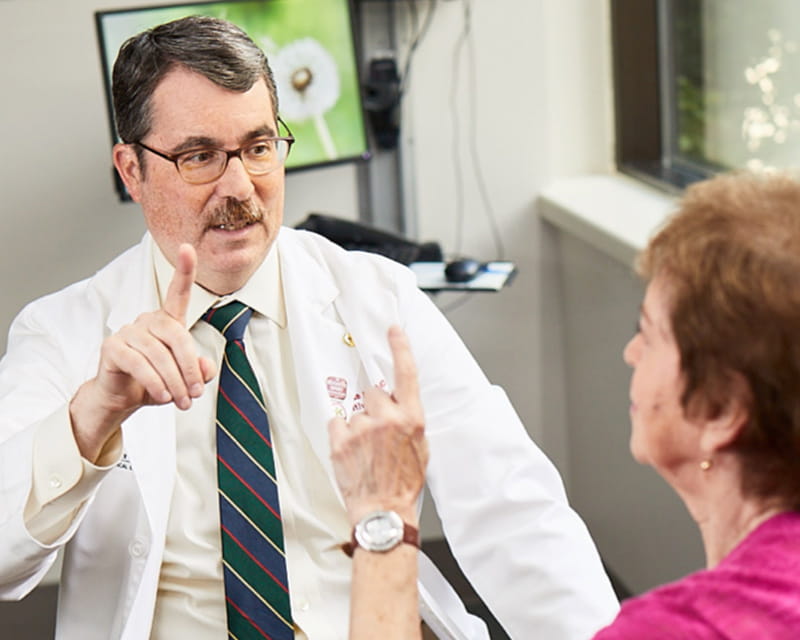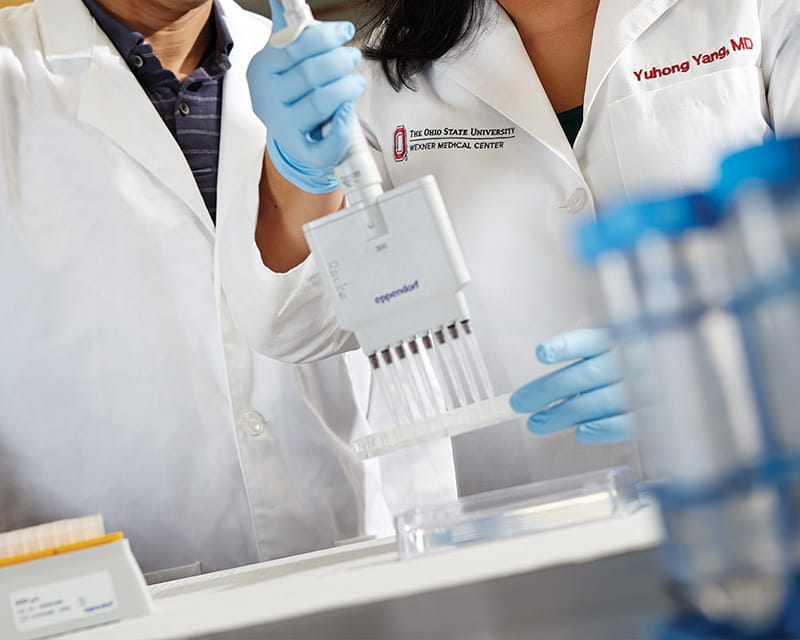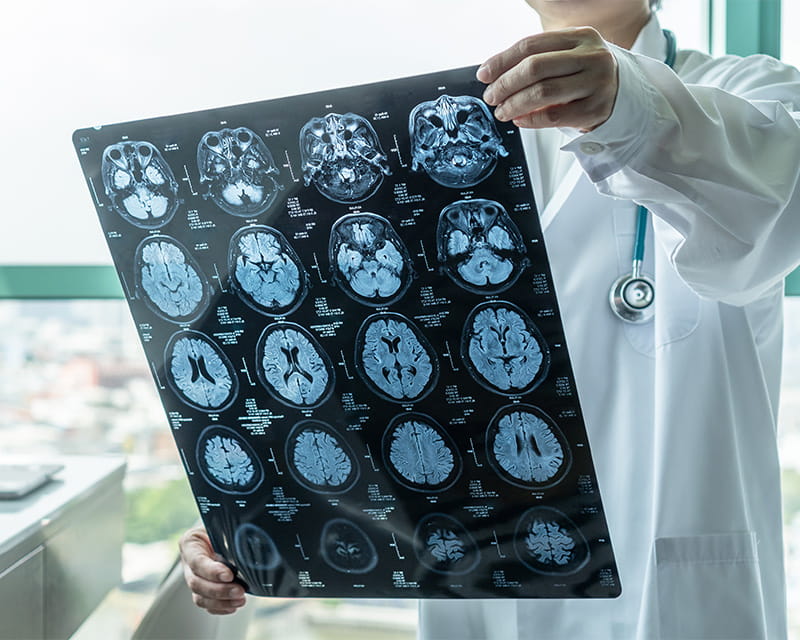
Ohio State researchers identify new biomarkers that differentiate Lewy body dementia from Alzheimer’s and Parkinson’s
 The Ohio State University Wexner Medical Center’s Department of Neurology invests in genetic counseling, testing
The Ohio State University Wexner Medical Center’s Department of Neurology invests in genetic counseling, testingA new Division of Neurogenetics within the Department of Neurology at The Ohio State University Wexner Medical Center will incorporate rapidly developing genetic technologies to diagnose and treat neurogenetic conditions, while expanding research opportunities for faculty and fellows. A genetically characterized patient population will help researchers more rapidly target and treat underlying disease mechanisms.
The department plans to grow the division into a robust team of genetic counselors, specialist-physicians and PhD faculty and scientists who will provide patients with genetic testing, counseling and treatment for a wide range of conditions, including movement disorders such Parkinson’s disease, dementias, motor neuron disease, muscular dystrophies and neuropathies.
Currently there are very few neurogenetics departments nationally and none in the Midwest, says Jennifer Roggenbuck, MS, LGC, one of two genetic counselors within the new division.
“This will be a very new and groundbreaking service for the Midwest population, where many do not have access to specialized services for genetic evaluation,” Roggenbuck says.
The number of multidisciplinary specialist clinics and clinical trials offered by the division is expected to grow alongside the program, says Victoria Klee, MS, LCGC, who’s a founding member of the division with Roggenbuck.
Right now, the division’s specialty clinical services are focused on motor neuron diseases including amyotrophic lateral sclerosis (ALS), movement disorders such as Huntington's and Parkinson’s diseases, neurocognitive conditions such as Alzheimer’s and a wide range of neuromuscular conditions.
Roggenbuck and Klee are also developing educational programs to enhance physician training in neurogenetics.
“It’s critical for neurologists to have some level of genetics training, but that doesn’t always happen,” Klee says. “That’s what’s unique about our program. Genetic counseling is still a small field, and the fact that we have specialists in neurogenetics training the next generation is unique.”
Roggenbuck says she and Klee hope to see patients with dementia, movement disorders and neuromuscular conditions in clinic or in counseling and enroll them in research studies whenever possible.
Research is already underway as the division participates in the PD GENEration study sponsored by the Parkinson’s Foundation. The Ohio State Wexner Medical Center is the 10th active study site on the fast track in the United States. and is actively recruiting patients. This means that Ohio State provides genetic counseling on-site for study participants, rather than requiring them to see a remote genetic counselor through the study’s centralized genetic counseling hub. The study provides free genetic testing and genetic counseling to patients.
Data collected help create a biorepository of information about the genes that cause Parkinson’s disease and the clinical characteristics of those with these genetic changes. PD GENEration analyzes or tests seven well-established genes known to be linked to Parkinson’s. The study gathers additional relevant information and may lead to future studies and treatments.
It’s a big deal, as genetic studies like this are often inaccessible to patients, Klee says.
“It’s like a Venn diagram looking at the genes of people with Parkinson’s,” Klee says. “With multiple centers collecting this information, it brings collaboration in using these data points for research and understanding.”
Since Roggenbuck joined the Ohio State Wexner Medical Center in 2014, she’s seen an increasing number of patients coming from farther away for genetic evaluations at Ohio State.
“We’re providing a service not available at many academic centers,” Roggenbuck says. “While a health system may have a division for neuromuscular conditions, they might not have genetic counselors who specialize in that.”
Roggenbuck and Klee hope to see more genetic counselors working in neurology. Ohio State’s Genetic Counseling Training Program (from which Klee graduated) can help achieve that goal.
“We also want to enhance training on how to practice medical genetics for residents and fellows,” Roggenbuck says. “This is part of our mission of the new division, especially as medical students look at our residency program and think about training for the genomics age.”
Genetic counselors work as genetic diagnosticians. When patients experience symptoms of early onset dementia, motor disease or muscle weakness, they may find themselves on a long journey toward a diagnosis.
“They might not have an answer for why these things are happening,” Roggenbuck says. “For many people, a genetic evaluation and testing can get us the answer.”
Years ago, muscle biopsies and elaborate algorithms might lead to a diagnosis. Today’s technology often provides answers in a few weeks from just one test.
Genetic counselors help patients:
“We help patients get answers and information about their condition,” Roggenbuck says. This can include genetic testing of healthy individuals to clarify their risk of a specific condition.
Genetic counseling services are not just for patients experiencing symptoms. Klee explains that people with a known family history of a neurogenetic condition can also benefit.
“We can help people learn more about their risks and potential future medical needs,” Klee says.
For example, someone with a family history of Parkinson’s disease can use genetic counseling to make informed choices about some health decisions before they experience symptoms.
The future of neuroscience could be closely tied to neurogenetics and the biomarkers and targeted therapies that are in active development. These types of personalized therapies hold promise for many.
Roggenbuck is currently focused on developing evidence-based national guidelines for genetics testing for patients with ALS. She earned a grant from the ALS Association for this work of evaluating patients early in their care journeys.
Ohio State’s ALS Clinic, one of several Ohio State Wexner Medical Center multidisciplinary clinics providing genetic services, also provides services in the areas of neurology; occupational, physical and speech therapies; respiratory therapy; and research in investigator- and pharmaceutical-led studies.
Genetic testing can open doors for gene-targeted therapies for patients with ALS. Ohio State is one of four sites nationally testing a potential treatment for ALS caused by the FUS mutation. Changes to this specific gene can cause ALS.
“In order to offer this type of therapy, we first need to identify the specific harmful change in the gene, and then we can create a genetic Band-Aid for that person so that it covers up the change, sticks to it and shuts it down,” Roggenbuck says.
Similar genetic targeted therapies are underway for treating Parkinson’s disease, too, Klee says. She hopes to expand their research into early onset dementia clinic and further characterize the genetic changes that cause different types of dementia.
Klee and Roggenbuck say this is the future of precision medicine in neurology: using genetic technology to diagnose, understand and treat the causes of neurodegeneration.

Ohio State researchers identify new biomarkers that differentiate Lewy body dementia from Alzheimer’s and Parkinson’s

Biomarker breakthroughs at Ohio State transform disease diagnosis, predictability and treatment

The Ohio State University Wexner Medical Center pushes boundaries for neurological care